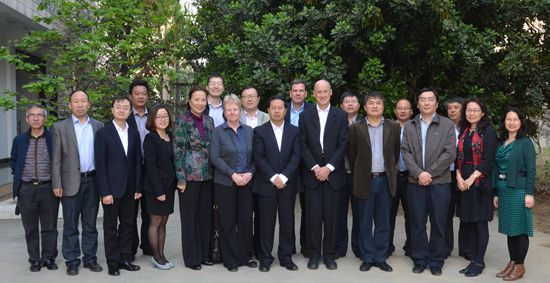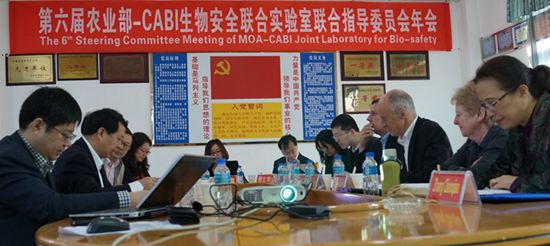分享到
The Sixth MOA-CABI Bio-safety Joint Laboratory steering committee meeting held at Dehong
The 6th Steering Committee (SC) meeting for “Ministry of Agriculture (MoA) -CABI Joint Laboratory for Bio-safety”, organized by the Institute of Plant Protection of CAAS (IPP-CAAS), CAB International (CABI) and “MoA-CABI Joint Laboratory for Bio-safety”, was held at Dehong, Yunnan Province from March 11th to 14th.
IPP-CAAS is the host and the secretariat for Joint Laboratory on behalf of MoA, while the Steering Committee (SC) is the governing body of the Joint Laboratory, which comprises of 8 members (4 from China and 4 from CABI). The SC normally meets once in a year, with the mandate for reaching unanimous agreement in respect to plans research activities, approving work plans and financial statements.
 The 6th SC meeting, approved annual report-2013, work plan for 2014 as well as discussed the new project development. The meeting elected Mr. Ian Barry (CFO of CABI) as the Chairman of the SC 2014, two co-directors Dr. Xueping Zhou (Director General of IPP-CAAS) and Dr. Ulrich Kuhlmann (Regional Director, CABI Switzerland), as well as members of the SC for 2014. The SC meeting is crucial for normal operation of the joint lab as well as overseeing the direction, development, approving project proposals and seeking for new avenues for funding applications.
The 6th SC meeting, approved annual report-2013, work plan for 2014 as well as discussed the new project development. The meeting elected Mr. Ian Barry (CFO of CABI) as the Chairman of the SC 2014, two co-directors Dr. Xueping Zhou (Director General of IPP-CAAS) and Dr. Ulrich Kuhlmann (Regional Director, CABI Switzerland), as well as members of the SC for 2014. The SC meeting is crucial for normal operation of the joint lab as well as overseeing the direction, development, approving project proposals and seeking for new avenues for funding applications.
The “MoA-CABI Joint Laboratory for Bio-safety" started on September 2008, and since then tremendous success has been realized on international exchange and cooperation according to the function and requirements stated in the agreement. These successes are: First, International cooperation, exchange and several international meetings have been carried out successfully, such as first and second ICBI (International Congress of Biological Invasions) in 2009 and 2013, International Symposium on Radar Entomology, Technology Transfer Workshop for Prevention and Control of Invasive Alien Species in Southeast Asia, etc. The meetings were attended by more than 1000 people from 50 different countries. By the end of 2013, over 30 Chinese experts have visited international institutions to explore new collaboration opportunities and develop joint projects. Young scientists were trained in advanced agricultural research and technology in UK, Switzerland and other developed countries. More than 150 international experts visited the Joint Lab for collaborative research and project development, which had managed a platform for IPP scientists to share updated research achievements and discuss collaboration with international experts in bio-safety area.
 Second, great achievement has been attained in collaborative research projects, such as two Europe Aid projects “Greater Mekong Sub-region rice IPM & maize IPM” funded by EU (10% co-funding by IPP and MOA) started to be implemented in 2010 and 2012, respectively. New project on “Transfer of biologically-based crop protection technology for soil pest control in vegetable production in Rwanda (2014-2015)” applied by CABI in collaboration with IPP was successful started, supported by AgriTT-Research Challenge Fund. The project started with the kick off meeting held in Rwanda in February 2014. CABI Global technology transfer project “Plantwise” has been made good progress in some demonstration areas in China.
Second, great achievement has been attained in collaborative research projects, such as two Europe Aid projects “Greater Mekong Sub-region rice IPM & maize IPM” funded by EU (10% co-funding by IPP and MOA) started to be implemented in 2010 and 2012, respectively. New project on “Transfer of biologically-based crop protection technology for soil pest control in vegetable production in Rwanda (2014-2015)” applied by CABI in collaboration with IPP was successful started, supported by AgriTT-Research Challenge Fund. The project started with the kick off meeting held in Rwanda in February 2014. CABI Global technology transfer project “Plantwise” has been made good progress in some demonstration areas in China.
Third, the Joint Laboratory sponsored twelve South-South Cooperation and Technology Training between 2009 and 2013, such as China-DPR Korea Training Workshop on Plant Protection and Quarantine Policy and Management, Rational Pesticides Use Training and Biological control of underground pests Training, etc.
Fourth, during the past five years the Joint Lab have published 10 papers on SCI journals and awarded a national invention patent.
Fifth, significant achievement has been made in the high-level expert training. Talent scientists Dr. Ulrich Kuhlmann, the co-director of the Joint Lab from CABI side, was awarded the Chinese government’s Friendship Award in 2012, Prof. Kongming Wu, the co-director of the Joint Lab from China side during 2008-2013, was elected as academician of the Chinese National Academy of Engineering in 2011 and promoted to be the Vice President of CAAS, indicating that the fruitful work of Joint Lab has been fully appreciate by the Chinese government.
Today, the Joint Lab has become an open platform for collaboration between China, CABI and CABI’s member countries.
IPP-CAAS is the host and the secretariat for Joint Laboratory on behalf of MoA, while the Steering Committee (SC) is the governing body of the Joint Laboratory, which comprises of 8 members (4 from China and 4 from CABI). The SC normally meets once in a year, with the mandate for reaching unanimous agreement in respect to plans research activities, approving work plans and financial statements.
 The 6th SC meeting, approved annual report-2013, work plan for 2014 as well as discussed the new project development. The meeting elected Mr. Ian Barry (CFO of CABI) as the Chairman of the SC 2014, two co-directors Dr. Xueping Zhou (Director General of IPP-CAAS) and Dr. Ulrich Kuhlmann (Regional Director, CABI Switzerland), as well as members of the SC for 2014. The SC meeting is crucial for normal operation of the joint lab as well as overseeing the direction, development, approving project proposals and seeking for new avenues for funding applications.
The 6th SC meeting, approved annual report-2013, work plan for 2014 as well as discussed the new project development. The meeting elected Mr. Ian Barry (CFO of CABI) as the Chairman of the SC 2014, two co-directors Dr. Xueping Zhou (Director General of IPP-CAAS) and Dr. Ulrich Kuhlmann (Regional Director, CABI Switzerland), as well as members of the SC for 2014. The SC meeting is crucial for normal operation of the joint lab as well as overseeing the direction, development, approving project proposals and seeking for new avenues for funding applications.The “MoA-CABI Joint Laboratory for Bio-safety" started on September 2008, and since then tremendous success has been realized on international exchange and cooperation according to the function and requirements stated in the agreement. These successes are: First, International cooperation, exchange and several international meetings have been carried out successfully, such as first and second ICBI (International Congress of Biological Invasions) in 2009 and 2013, International Symposium on Radar Entomology, Technology Transfer Workshop for Prevention and Control of Invasive Alien Species in Southeast Asia, etc. The meetings were attended by more than 1000 people from 50 different countries. By the end of 2013, over 30 Chinese experts have visited international institutions to explore new collaboration opportunities and develop joint projects. Young scientists were trained in advanced agricultural research and technology in UK, Switzerland and other developed countries. More than 150 international experts visited the Joint Lab for collaborative research and project development, which had managed a platform for IPP scientists to share updated research achievements and discuss collaboration with international experts in bio-safety area.
 Second, great achievement has been attained in collaborative research projects, such as two Europe Aid projects “Greater Mekong Sub-region rice IPM & maize IPM” funded by EU (10% co-funding by IPP and MOA) started to be implemented in 2010 and 2012, respectively. New project on “Transfer of biologically-based crop protection technology for soil pest control in vegetable production in Rwanda (2014-2015)” applied by CABI in collaboration with IPP was successful started, supported by AgriTT-Research Challenge Fund. The project started with the kick off meeting held in Rwanda in February 2014. CABI Global technology transfer project “Plantwise” has been made good progress in some demonstration areas in China.
Second, great achievement has been attained in collaborative research projects, such as two Europe Aid projects “Greater Mekong Sub-region rice IPM & maize IPM” funded by EU (10% co-funding by IPP and MOA) started to be implemented in 2010 and 2012, respectively. New project on “Transfer of biologically-based crop protection technology for soil pest control in vegetable production in Rwanda (2014-2015)” applied by CABI in collaboration with IPP was successful started, supported by AgriTT-Research Challenge Fund. The project started with the kick off meeting held in Rwanda in February 2014. CABI Global technology transfer project “Plantwise” has been made good progress in some demonstration areas in China.Third, the Joint Laboratory sponsored twelve South-South Cooperation and Technology Training between 2009 and 2013, such as China-DPR Korea Training Workshop on Plant Protection and Quarantine Policy and Management, Rational Pesticides Use Training and Biological control of underground pests Training, etc.
Fourth, during the past five years the Joint Lab have published 10 papers on SCI journals and awarded a national invention patent.
Fifth, significant achievement has been made in the high-level expert training. Talent scientists Dr. Ulrich Kuhlmann, the co-director of the Joint Lab from CABI side, was awarded the Chinese government’s Friendship Award in 2012, Prof. Kongming Wu, the co-director of the Joint Lab from China side during 2008-2013, was elected as academician of the Chinese National Academy of Engineering in 2011 and promoted to be the Vice President of CAAS, indicating that the fruitful work of Joint Lab has been fully appreciate by the Chinese government.
Today, the Joint Lab has become an open platform for collaboration between China, CABI and CABI’s member countries.
Latest News
-
 Apr 18, 2024Opening Ceremony of the Training Workshop on Wheat Head Scab Resistance Breeding and Pest Control in Africa Held in CAAS
Apr 18, 2024Opening Ceremony of the Training Workshop on Wheat Head Scab Resistance Breeding and Pest Control in Africa Held in CAAS -
 Apr 03, 2024IPPCAAS Co-organized the Training Workshop on Management and Application of Biopesticides in Nepal
Apr 03, 2024IPPCAAS Co-organized the Training Workshop on Management and Application of Biopesticides in Nepal -
 Mar 28, 2024Delegation from the School of Agriculture and Food Science of University College Dublin, Ireland Visit to IAS, CAAS
Mar 28, 2024Delegation from the School of Agriculture and Food Science of University College Dublin, Ireland Visit to IAS, CAAS -
 Mar 25, 2024Director of World Food Prize Foundation visited GSCAAS
Mar 25, 2024Director of World Food Prize Foundation visited GSCAAS -
 Mar 20, 2024Institute of Crop Sciences (ICS) and Syngenta Group Global Seeds Advance Collaborative Research in the Seed Industry
Mar 20, 2024Institute of Crop Sciences (ICS) and Syngenta Group Global Seeds Advance Collaborative Research in the Seed Industry
